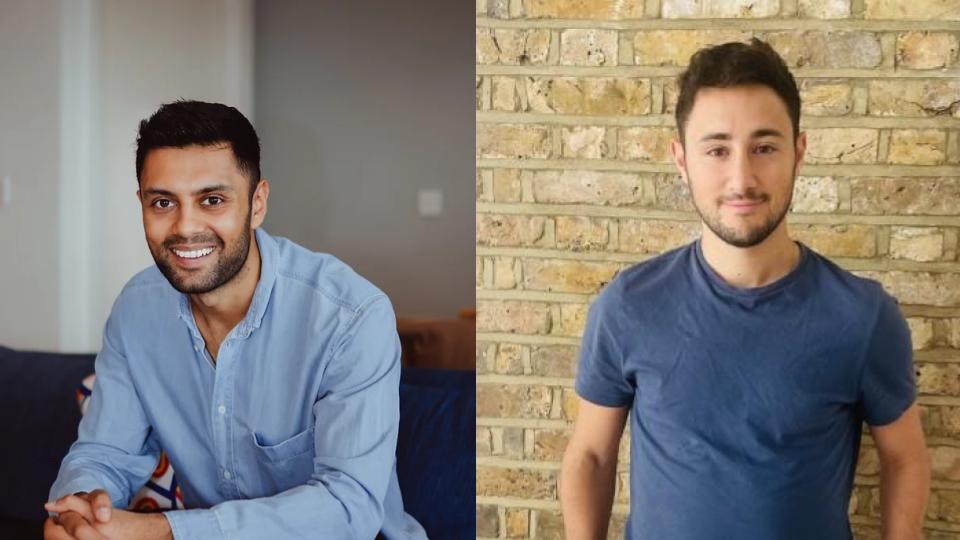Tell Us About Wenup. – How Did You Come Up With The Idea?
James: I have spent my career building and investing in services marketplaces. As an entrepreneur I co-founded Deazy, a marketplace for engineering teams that has been scaled through to private equity funding, and also worked for over a decade as a VC investing in several others.
Last year, I set up a venture builder firm specialising in creating online services marketplaces, and couples agreements were one of the first areas I wanted to explore, because having been through the process of creating an agreement the traditional way, I was aware that the process could be made much more efficient and affordable through the use of technology.
My wife and I looked into prenup agreements before we got married several years ago. We already knew how we wished to split out our assets in the event of a divorce, and so thought the process would be relatively straightforward, but despite going for the most affordable option we could find at the time, the total cost including the separate legal advice we both needed was upwards of £3,000, which felt high relative to the size and complexity of our asset base and given we knew what we wanted the agreement to capture.
The end-to-end process was also very time consuming and more stressful than it needed to be, which was an added stress on top of organising a wedding.
Prenups and other couples agreements get a bad name because of the preconceived notion that it’s one (richer) party, traditionally the man, protecting against a less well off party. None of this applied to my wife and I, but it felt as though a process didn’t exist for a situation and a demographic like ours.
My wife and I had both accumulated assets by the time we got married in our 30s, but would not have been considered high net worth. We both wanted to protect our respective assets. Having seen in loved ones the the impact a divorce can have on finances, we wanted to put in place something from a position of love, rather than arguing from a position of resentment as can sometimes be the case further down the line.
Having spoken to friends about our experience, it became clear that our situation was more common than I realised. For previous generations, marriage tended to take place at the very beginning of adulthood and the couple would build an asset base together from the ground up, but people are getting married later these days, often with assets accumulated prior to marriage and in situations where a 50/50 split might not be the fairest outcome in the event of a divorce.
This insight coupled with my experience of growing similar businesses in other markets made me confident this was a problem worth solving and that I would be well placed to help solve it, but I knew I needed someone with a legal background to work with on the business as I knew very little about law.
Mohsin:All in all I spent 13 years as a litigator. First at international law firm Linklaters, then a year at the UK Supreme Court and then as a barrister at one of leading chambers in London. At the Supreme Court I worked with a judge that had a family law background and it really got me thinking about how inaccessible family law is to everyone but the richest.
Years later, as I was about to get married I started thinking about what would happen if we ever got divorced. Some people think this is somehow unromantic or disrespectful but I think you’re actually more likely to succeed in marriage if everything is on the table. You can communicate effectively and lovingly even about the hard stuff. James and I were (and are!) friends and struck up a discussion about it and he said there had to be a way to make relationship agreements more affordable and accessible to ordinary people like us.
Having worked as both a solicitor and a barrister, I know (and mostly respect) why lawyers charge as much as they do but the law is the instrument of the people. It should be more readily available to them. And so we got thinking about how to achieve this. I was a qualified direct access barrister, which meant that in certain strictly prescribed circumstances, clients could come to me directly rather than having to pay a solicitor as well. This isn’t always cheaper but it can save on costs and, depending on the work, is helpful to self-employed barristers whose diaries are changing by the hour. We contacted a family law barrister who confirmed that the model could work and then set about building it.
We’re now up and running, with James doing a fantastic job as CEO and me on the board. I’m proud of where we are at because I do think Wenup helps widen access to legal services. I feel lucky i get to do it with my buddy and, importantly, someone who I respect immensely.

What makes Wenup unique?
James: We have made the process of creating couples agreements amicable, affordable and digital.
The couple agrees how they wish to split their assets prior to using our platform and enters their information together to populate a draft of their agreement.
After the couple have produced a draft of their agreement, we connect each of them separately with an experienced family lawyer for a 1-hour conversation to ensure each of them has received the legal advice they need for in accordance with the guidelines on prenups and postnups in the UK.
We do all of this for a fixed fee of £999 or £499.50 per person, which includes an hour with a separate experienced family lawyer for each member of the couple
This is delivered at a fraction of the typical cost of an agreement and the legal advice, in a simple format that does not require both partners to select, onboard and engage their own family lawyers and in a way that is both convenient and straightforward using an online platform.
Mohsin: The law commission issued guidance on what factors go into making a relationship agreement valid and we’ve modelled that closely. Ultimately the court has the power to override agreements but because of developments in case law, agreements are given a lot more weight than they used to. We have a family law advisor who also helps keep our set up up to date with any developments in the law. There is no point making something affordable if it doesn’t do the job it’s supposed to. What’s great about Wenup is that we’ve built something that does what a relationship agreement is supposed to, but without charging an arm and a leg for it.
As I mentioned above, it’s also great for barristers because it allows them to fit the work around their busy diaries – unlike court commitments which are unwavering. From our early experience, an added bonus is that instead of just dealing with the fall out from divorce, barristers that work with us are getting to interact with couples that are in love and who very much want their marriages to succeed. One described it to me as a “professional breath of fresh air”. They also really believe in these agreements. They think it would make things a lot less messy – and they would know because they are the ones cleaning up the mess!
More from Interviews
- A Chat with Dr. Stuart Grant, Founder and Principal Consultant at Archetype and Judge in the MedTech38 2025
- Interview With Raman Alsheuski, VP of Product at AIBY
- Meet Greg Squibbs, Founder of AI Agency Training Hub: StartYourAIAgency.com
- Meet Eamon and Arj, Co-Founders Of Tax Return Platform: Taxd
- Interactive Fun and Entertainment: Meet Jonny Powell, CEO of 501 Fun
- Meet Jaron Soh, Co-founder & CEO of LGBTQIA+ Mental Wellness App: Voda
- Meet Nathalie Morrison: The Founder Behind Astrea, the Fashion-Tech Brand Putting Lab-Grown Diamonds at the Heart of Luxury
- Meet Badr Ward, CEO And Founder Of Education Platform: Lamsa
How has Wenup evolved to date?
Mohsin: After James approached me, I spent a great deal of time producing the templates we use and determining the logic for the agreements with support from some of the fantastic family lawyers I have in my network. It took longer than we expected to get the agreement and platform into a position we were comfortable with but it was important we got this right from the outset because of the nature of the product we offer.
James: Once we were comfortable with the product offering, we raised a pre-seed round from VGC Partners earlier this year, which allowed us to launch and start serving customers. So far, traction has been great, we reached our September target in May and are seeing a growing in flow of customers from week to week.
What can we hope to see from Wenup in the future?
James: There are other agreement types our model lends itself nicely to. Next on the roadmap is cohabitation agreements, which we expect to launch before the end of the summer.



